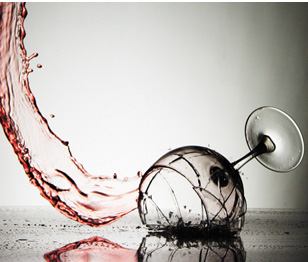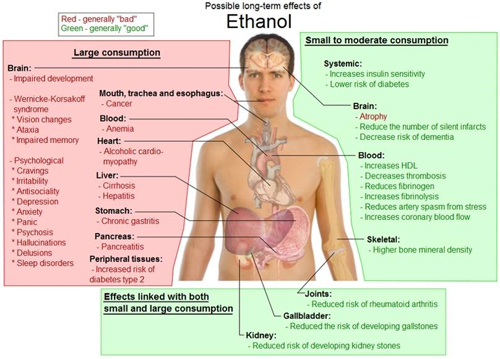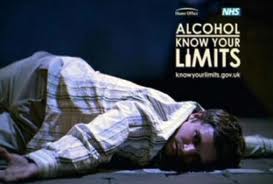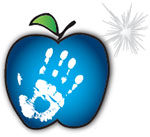
Alcohol and caffeine are the two most widely used drug substances in the world. Alcohol use is not only an adult problem. Most American high school seniors have consumed an alcoholic drink within the past month, despite the fact that the legal drinking age is 21 years old in the U.S. A person’s alcohol use is primarily influenced by attitudes developed during the childhood and teen years. It is impacted by: family relationships, parents’ attitudes and behaviors toward drinking, peer influence and society.
The effects of alcohol may appear within 10 minutes and peak at approximately 40 – 60 minutes. Alcohol stays in the bloodstream until it is broken down by the liver. If a person consumes alcohol at a faster rate than the liver can break it down, the blood alcohol level rises. Each state has its own legal definition of alcohol intoxication, which is defined by blood alcohol level. The legal limit usually falls between 0.08 and 0.10 in most states. Different levels lead to different effects. Alcohol depresses your breathing rate, heart rate, and the control mechanisms in your brain.

Alcohol increases the risks of:
- Alcoholism or alcohol dependence.
- Falls, drowning, and other accidents.
- Head, neck, stomach, and breast cancers.
- Motor vehicle accidents.
- Risky sex behaviors, unplanned or unwanted pregnancy, and sexually transmitted diseases (STDs).
- Suicide and homicide.
- Alcohol can cause birth defects or fetal alcohol syndrome (a disorder marked by mental retardation and behavior problems).
- Impaired short-term memory and reduced attention span.
- Reduced inhibitions, which may lead to embarrassing behavior.
- Slower thought processes.
RESPONSIBLE DRINKING
If you drink alcohol, it is best to do so in moderation. This is defined as not causing intoxication, and consuming no more than 1 beer, 1 glass of wine, or 1 shot of liquor per day if you are a woman and no more than 2 if you are a man. Studies have shown that wine may be beneficial to health, but is unhealthy when consumed in large amounts. Here are some ways to drink responsibly, provided you do NOT have a drinking problem, are of legal age to drink alcohol, and are not pregnant:
- NEVER drink alcohol and drive a car.
- If you are going to drink, have a designated driver, or plan an alternative way home, such as a taxi or bus.
- Do not drink on an empty stomach. Snack before and while drinking alcohol
If you are taking medication, including over-the-counter drugs, check with your doctor before drinking alcohol. Alcohol can intensify the effects of many drugs and can interact with other drugs, making them ineffective or dangerous, or making you sick. Do NOT drink at all if you have a history of alcohol abuse or alcoholism. If alcoholism runs in your family, you may be at increased risk of developing alcoholism yourself, and may want to avoid drinking alcohol altogether.
ALCOHOLISM

Alcohol dependence (alcoholism) is a disease that includes:
- The need to drink greater amounts of alcohol to get high.
- A strong urge to drink.
- Not being able to control your drinking even though you know that it is harmful.
- Withdrawal symptoms, such as nausea, sweating, and shakiness when you stop drinking.
Signs that you have lost control over your use of alcohol include:
- Not being able to limit your drinking even when you try.
- Having problems at work or with friends or family because of your alcohol use.
- Spending a lot of time and energy drinking alcohol or getting over its effects.
Alcohol dependence is one of the most common illnesses seen by healthcare providers. It is especially serious in older people. Abuse of alcohol may cause health problems or make existing health problems worse. The cause of alcohol dependence is not known. It is more likely if you have:
- Family members who are dependent on alcohol.
- Stress that is ongoing.
- Family and friends who drink regularly.
- ADHD, depression, bipolar disorder, schizophrenia, or anxiety.
TREATMENTS

You must stop drinking alcohol. Your healthcare provider can help you quit drinking and recover from problems caused by alcohol. Psychotherapy and social programs are often part of recovery. Family members may be included in your treatment program.
After immediate withdrawal from alcohol (detoxification), there are several options for treatment. You and your treatment team will decide which options make the most sense for you. Support groups such as Alcoholics Anonymous (AA) or a program such as Rational Recovery may be recommended.
Your healthcare provider may prescribe a medicine for you called Antabuse (Disulfiram). This medicine will cause you to have severe nausea and vomiting if you drink alcohol and thus will discourage you from drinking. Other medicines for treating alcohol dependence are naltrexone and acamprosate. Naltrexone can help you overcome cravings for alcohol. It blocks the feelings of pleasure that drinking gives you. Acamprosate helps to relieve the withdrawal symptoms which happen when a person stops drinking. These medicines often work best when used along with therapy and support groups. Antabuse is not recommended for use in older adults or people with medical problems because of the increased risk of serious side effects.

Make sure you seek medical help. Recovery from alcohol dependence almost always requires the help and support of others. Make sure you get this support. People and resources in your community that can help you include your healthcare providers, therapists, support groups, mental health centers, and alcohol or substance abuse treatment programs.
Follow your healthcare provider’s advice for treatment of any other medical problems. Stay away from situations where people are likely to abuse drugs or alcohol. You should also work to improve your general health:
- Exercise for at least 20 minutes every day, for example, take a brisk walk.
- Develop and participate in hobbies or relaxing recreation activities at least once or twice a week.
- Eat a healthy diet.
- Get 7 to 9 hours of rest per night.
- Practice deep breathing and other relaxation exercises during times of high stress.
- Talk with friends and develop other support systems.
- Avoid family and friends who drink regularly.
- Avoid situations where people are likely to use alcohol or drugs.
- Drink little or no caffeine.
- Listen to music to help you relax.
- Develop and maintain a positive attitude.
- Ask for help at home and work when the load is too great to handle.
- Seek professional help to talk through anxiety-producing life events. Ask for help so that you can find positive ways to cope.
